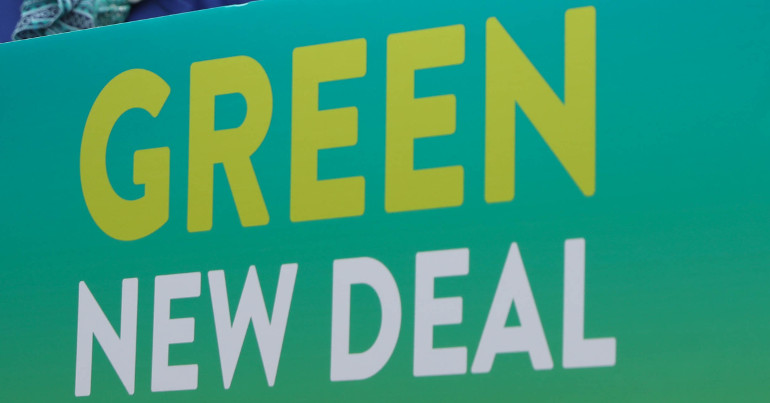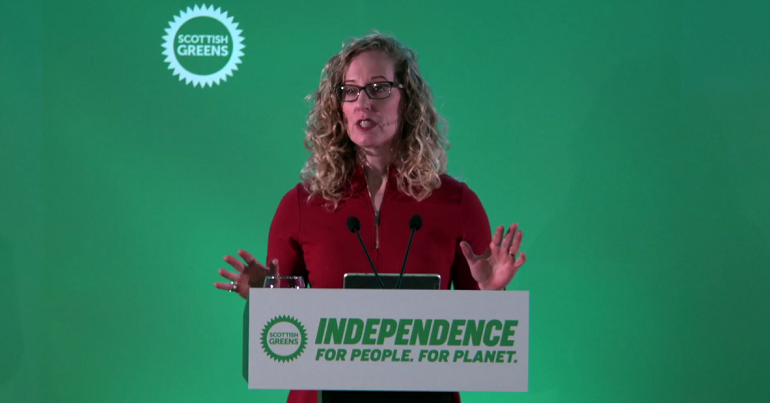5 reasons why a Green New Deal and Universal Basic Income go hand in hand

There has been much discussion in political circles and indeed the wider press over the last year about a Green New Deal after media savvy Americans like Alexandria Ocasio-Cortes revived the idea of the original Green New Deal group. However, one opportunity that has so far been missed is the chance to combine a Green New Deal with a Universal Basic Income to bring about a truly transformative change to society as well as to the infrastructure of the country.
And this transformation is sorely needed with our modern economy not serving the needs of the majority while trapping the population in an endless cycle of long hours, precarious work, insecure housing and, in too many cases, poverty and reliance on food banks. For the fifth richest country in the world, this is no where near good enough.
Universal Basic Income provides a floor for everyone, lifting millions out of poverty, dramatically reducing the high rates of rough sleeping and empowering people to take ownership of their lives. Instead of being hopelessly trapped in our current failed economic model people would finally be afforded the freedom they deserve and can better decide who they work for, how long they work, and what they want to do with their time. From a social justice point of view, Universal Basic Income will be a huge step forward.
However, there are reasons why Universal Basic Income could also lead to significant progress for the environment, which haven’t previously been widely discussed. For example, with changes in work life balance such as the introduction of a four day week, people may work less, have extra money to change their spending habits and may even use individual bargaining power to refuse work which is environmentally degrading. This is why any Green New Deal programme should also include Universal Basic Income to add a personal side to the systemic changes which will come in a ‘green industrial revolution’. There are also other reasons why Universal Basic Income will work in tandem with a Green New Deal and in fact it could be vital for the implementation of a Green New Deal. Here are five of them.
1. Prioritising economics over environment
Economic factors always have more immediate appeal to the wider public than saving the environment. This doesn’t mean they aren’t intrinsically linked. In fact they go hand in hand. But Maslow’s hierarchy of needs indicates that social and economic needs are the foremost concern.
Therefore, appealing to people’s economic concerns is an indirect way to fashion a better environment. If and when economic concerns are alleviated, it follows that people will have more capacity to think about the environment. That’s obviously not to say that the environmental message isn’t used as part of the narrative of a Green New Deal but acknowledging that not everyone is worried about the climate crisis, or has the time and right frame of mind to address the issues that arise because of it.
2. Compensation for the public
There will be disruption with a Green New Deal as the infrastructure in the country will have to be overhauled. Millions of homes will be need to retrofitted which can be quite intrusive in people’s homes. New building sites to manufacture, wind turbines and solar panels will spring up causing disruption and potential NIMBY concerns may try to prevent these from being installed. There may be diversions to traffic as new travel systems set up.
On top of this, there may be unpopular tax and fiscal decisions and so the public needs to feel part of the Green New Deal rather than it being something passed down to them from the top. We have seen what can happen in countries when unpopular tax reforms happen e.g. yellow vests in France. The Green New Deal might result in higher prices and/or higher taxes in the short term as either businesses or government seek to fund its share of the required investment.
In this eventuality, we should seek to compensate consumers and households who are expected to pay more in this situation. A key part of this compensation could be a carbon dividend which would be derived from the carbon tax that the government could use. If this was to start at £100 per tonne of CO2 emitted, there would be around £50 billion raised, and a significant portion could go back into people’s pockets. This would then gradually be ramped up over time to incentivise the transition at the earliest possible stage.
3. A just transition for workers
Work patterns will change and older industries will become extinct. Whilst we transition to a long term sustainable job market there needs to be support for those want to retrain, who want to shorten their work week or who want to take an early retirement. Trade unions have a part to play in the just transition and can fight for their workers. However, with each union fighting for themselves, it is difficult to get the joined up thinking to suit all workers.
Universal Basic Income provides support for everyone to make individual decisions and adds a powerful bargaining chip for workers and trade unions. Imagine how much more powerful strikes could be with basic income supporting workers whilst they push for industrial action. It isn’t hard to see how basic income could redefine the world of work itself.
4. Work less, emit less
A Green New Deal is aiming to get to zero carbon as soon as possible. As well as greening the current supply of energy through the use of renewables, there needs to be continued emphasis on driving down the amount of energy we use in the first place. Research shows that one way to reduce energy usage is through working less, and a Universal Basic Income could help to facilitate this.
Most forms of working are carbon intensive- you have to get to and from work, with many people driving by themselves often for a many miles round trip. Then at work you are on a computer/telephone all day, sitting in a large room which needs to be lit, kept at the right temperature and have a regular supply of drinks and food to eat.
On the other hand, when you are at home you emit less- you still cook and clean as much as before and might watch more TV and use more power but on the whole it’s far less than you emit during the work day. In addition, you may decide that the extra spare time you have can be filled by doing something to further help reduce emissions such as tree planting. A government which has a full plan worked through could heavily incentivise these types of carbon negative activities.
5. A long term approach to transforming society
A Green New Deal is a short-medium term project that will see the implementation of an ambitious transformation in the infrastructure we have. However, it needs to have a long term impact on society.
A Universal Basic Income brings about a much more sustainable economic situation and will influence the behaviours of generations to come. The additional security will transfer the market away from ‘bullshit jobs’ to a more meaningful lifestyle. It would support the much-needed shift towards a society that focuses on the wellbeing of its citizens.
Delivering the transition with a Green New Deal and Universal Basic Income
The current economic model is broken primarily because it redistributes power to those who are already wealthy and possess economic advantage. This increases insecurity of those on lower incomes and exacerbates poverty and inequality over time, and explains how the numbers of those in poverty increases even as the economy grows.
The current economic model falls short of its potential by having no plan to devolve the wealth and power from the government to the individual. Instead it is down to the individual to take risks themselves by getting a loan/credit and then paying it back- unless you are certain of the outcome this can be a scary prospect, so people don’t. So if you don’t have access to money to begin with, it is hard to break out of the system. If you have wealth, you can use that to make more money and quickly multiply your wealth. You see it fairly often- children of wealthy parents become successful in their own merit because they have the foundation support. In pilot studies of Universal Basic Income in several countries, it has been shown that entrepreneurship increased among those who received a Universal Basic Income, even when the payment was relatively small. It’s impact in the UK could be enormous!
The current economic model needs to end and be replaced at the earliest possible point with a fairer, more equal system that redirects money from the coffers of the landowners, asset-rich and big businesses, who all have been the biggest contributors to environmental degradation, and in to the hands of households. Let’s use the Green New Deal to green the economy but lets empower the nation too and free up its potential.
Header image credit: Creative Commons: Senate Democrats




When the wall fell we rejoiced that the echo of Satan from Marx to Mao had been understood as an evil lie and here you are now the native extension of the same diabolical obsession with destroying mankind .
Tyranny by any other name surrendering to the faux gods of global warming ( opps that didn’t work ) climate change ( that is safer and more encompassing )and a misconstruction of justice and vilifying of capitalism the one genie of human embetterment that gives every individual the opportunity to the pursuit of their dreams.
Mouth wash for simple hygiene and education to clear your dishevelled mind
This is nothing less than preaching to the choir. An echo chamber. There is a very significant populace that does not share your view. How do you plan on persuading them to agree? Because they have zero interest in the underlying implied world wide socialist society/government. Perhaps just forcing them into that society? And that is just?
What a load of crap where are the unicorns.commie bs
And when the rest of the world hears we are giving out money and all of them want to come here, than what
Good job outlining the relationship between UBI and our mission to reduce carbon emissions. As long as our economy primarily is driven by fossil fuel, working less is perhaps the most impactful thing the public can do, far more effective than recycling or buying an electric car. It is exactly this kind of radical solutions out climate needs.
Tax takes cash from people. Basic Income gives cash to people. So it actually reduces taxes. It is the polar opposite of the Poll Tax. This tax reduction will need to be replaced by other taxes (e.g. tax on carbon) to remain tax neutral overall.
Interesting article Martin but where are details of the Basic Income Scheme you are proposing? From memory in the last Green Party manifesto is was £75 a week (or less than the current state pension). I have a feeling that you’re expecting this modest amount to do a lot of lifting! There will have to be many other benefits still in place if this is the limit of the ambition.
But even this modest scheme requires quite considerable tax increases.